[youtube]http://www.youtube.com/watch?v=jbn3rOPmR9w[/youtube]
- Observing people with a common interest in a moment of elation gives me goose bumps.
- National pride—something America could use a lot more of.
-
Rudy is my favorite sports movie, so anything that uses its soundtrack gets high marks from me.
- It’s fun watching your country master one of the few things it has yet to master.
- Goonies never say die. And the U.S. soccer team is comprised entirely of Goonies.
- Last minute goals are awesome.
- Hollywood endings happen in real life.
- It demonstrates why the World Cup is such an exciting sporting event.
Go, USA!

WIMBLEDON, England – The longest match in tennis history was suspended because of darkness at 59-59 in the fifth set at Wimbledon on Wednesday night.
The first-round match between 23rd-seeded John Isner of Tampa, Fla., and qualifier Nicolas Mahut of France already had been suspended because of fading light Tuesday night after the fourth set.
They have been playing each other for a total of exactly 10 hours — 7 hours, 6 minutes in the fifth set alone, enough to break the full-match record of 6:33, set at the 2004 French Open.
Awesome.
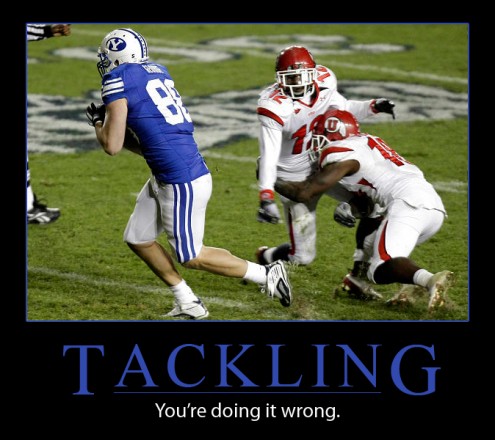
If there’s one thing I don’t like about BYU fans, it’s that some of them actually cheer for Utah when the latter are playing abroad “because it’s good for the Mountain West Conference.”
Sickos. (Didn’t anyone teach them that the enemy of my enemy is my friend?)
Thankfully, this lame behavior by Cougar fans should finally die as Utah this week became the newest member of the PAC-10 conference. So from now on, I expect Cougar Nation to root for the everlasting demise of the Utes.
In other words: Go, Washington. Go, Washington State. Go, Oregon. Go, Oregon State. Go, Cal. Go, Stanford. Go, USC. Go, UCLA. Go, Arizona. Go, Arizona State. Go, Colorado.
But most of all, go, BYU!
[youtube]http://www.youtube.com/watch?v=Ezk0e1VL80o[/youtube] Appropriately making its debut during halftime of the USA-England World Cup game last Saturday, I love this commercial. Freedom aside, I also love all three American muscle car reboots: Challenger, Mustang, and Camaro very much included. Would probably buy the Mustang though.
[youtube]https://www.youtube.com/watch?v=EUTzrMZVAAw[/youtube]
In honor of the World Cup, which starts today, here’s how to call a goal, courtesy of Andres Cantor.
Adidas + Star Wars + Mischief + Daft Punk + Snoop Dog = Fun
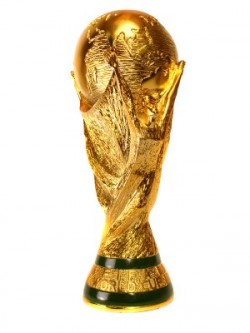 Soccer doesn’t make much sense to Americans. Admittedly, it defies many principles we value most in domestic sports, including conclusive endings, lots of scoring, and sportsmanship (aka the opposite of this). Nevertheless, every four years, the World Cup turns numerous Americans into fans of the sport, including Los Angeles native Eric Altshule, who writes:
Soccer doesn’t make much sense to Americans. Admittedly, it defies many principles we value most in domestic sports, including conclusive endings, lots of scoring, and sportsmanship (aka the opposite of this). Nevertheless, every four years, the World Cup turns numerous Americans into fans of the sport, including Los Angeles native Eric Altshule, who writes:
When I was 11, I thought soccer was gay. How could it not be? Sports was an activity broadcast on network television with production values and drunken announcers like Howard Cosell. Soccer was (at least in Los Angeles) a grainy, week-old, video of a Bundesliga game broadcast on PBS (which in itself is gay) narrated by some guy with a British accent. I played Little League and basketball, and one year my mom signed me up for soccer because she thought it was European, and thus cultural (i.e. gay). Our team name was The Leprechauns (how gay is that?) because some kid’s Irish dad was the coach. No thanks to my skills, we ended up winning our league, and I hid that trophy way back in the closet where nobody would ever see it and told my mom that I never wanted to play that dumb sport again.
Continue reading…
These videos profiling World Cup final goal scorers are awesome for the following reasons:
- They’re beautifully filmed.
- I love watching old people smile as they reminisce their proudest moments from the past.
- I love sports biographies.
- I love scoring.
- I love World Cup soccer.
Note: Smooth Harold will likely be overrun with World Cup-related posts for the next two months. You’ve been warned.
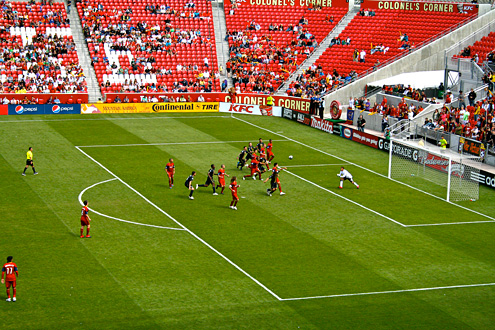
I had the chance to cover Real Salt Lake last week on assignment for USA Soccer Stud. In addition to following two World Cup hopefuls from the press box, I snapped some pics with my trusty (but basic) SLR camera. Who knew sports photography was this hard!?
(Sorry for ever doubting you, photojournalists). Following are some of the better shots I took, sans telephoto lens, and by better I mean not very good. Keep reading…
PROVO, UT—Multiple sources today have confirmed that the fabled Mr. and Mrs. Blake Snow have decided to honor Fenway Park with their attendance this year. Set for a visit in October, the couple will realize a life-long dream of seeing the Evil Empire (read: Yankees) play Evil Empire Jr. (read: Red Sox) at the oldest active ballpark in America.
“We are thrilled to finally receive Mr. and Mrs. Snow as our personal guests to the Capital of New England,” said Thomas M. Menino, mayor of Boston. “Their reputation precedes them, so it truly is a source of pride for us. And since they are purported thousandaires, it wouldn’t hurt if they spent a little money on tourism.”
Continue reading…
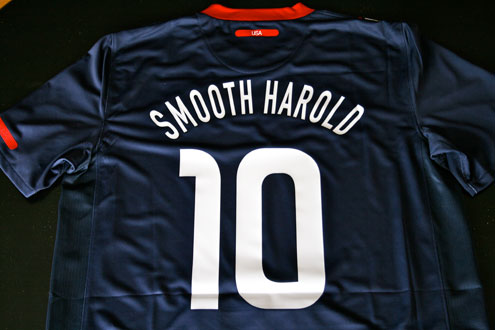
Well I’m officially ready for the World Cup. Front side after the break. Continue reading…

Robert Bradford/USA Soccer Stud
NEW YORK—When you picture Brazil at the World Cup, you expect them in yellow. When you envision Italy, you know they’ll be wearing royal blue. England wears red. Argentina wears baby blue stripes. And Holland dons solid orange.
The United States? They don’t have a signature look, something U.S. Soccer and Nike are hoping to change with the release of new home and away “sash” jerseys. Yes, they look like something a beauty pageant contestant might wear. But there’s a meaningful reason behind the diagonal stripe.
Continue reading…
I’m no conspiracy theorist. But I do believe in conflicts of interest. Which is why if I would never hire a foreign national team coach, like many modern soccer nations do.
I understand it’s faster to import coaching talent than to develop it yourself, something which can lead to immediate improvements. But let’s suppose England faces Italy in the World Cup final this summer, which is what they will do if both teams win their groups and go all the way.
England is led by Italian coach Fabio Capello. I’m sure he’s an honest man and all. And it’s doubtly he’d sabotage his employer by somehow jeopardizing said game. But the possibility of temptation is very real, solely because he is not a home grown coach. Never mind his proximity to Sicily.
With so much on the line then, why would a national team (of any sport) ever risk that?
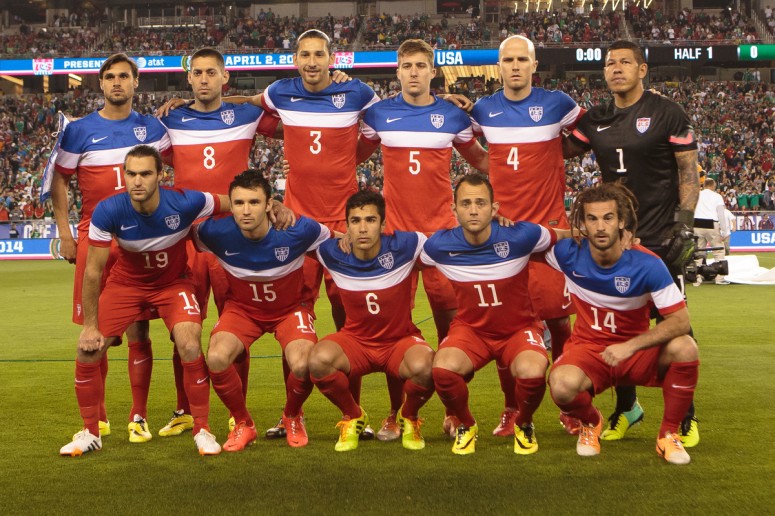
U.S. Soccer
Unconventional bravery has always been USA’s winningest soccer strategy.
Although losing its first unofficial match 0-1 to Canada in 1885, the United States men’s national team beat Sweden 1-2 in its first official match played in 1916. Historian David Wangerin noted how the upset was achieved in my new favorite soccer book, Soccer in a Football World:
Sportswriter Carl Linde observed how much ground the American forwards covered and how their sheer willpower often compensated for a lack of technique. Linde claimed this style represented “a new way of playing” and that the visitors “form a very dangerous team, mainly through their primitive brutality; through their speed and through their will to win at all costs.” Another writer remarked that such energetic play made the home side Sweden look as though they were engaged in “exercise for older gents.” (p. 85)
After the game, U.S. coach Thomas Cahill added, “We were outclassed by the Swedish players on straight football. It was American grit, pluck, and endurance that won. No great football stars were members of our team, but we had the pluckiest aggregation ever banded together.”
To this day, America still plays a more primitive game when compared to giants such as Brazil, Italy, and Germany. You have to respect that. Otherwise you’ll slow play it as the underdog, ineffectively counter attack, and ultimately lose playing better opponents. This, I fear, is what U.S. coach Bob Bradley will do this summer to our team’s eventual demise. Continue reading…
“Oh Ten” has already been kind to sporting events. The Super Bowl was actually worth watching this year. The Winter Games were better this time than four years ago. And March Madness was crazy good—the most exciting first round I’ve ever seen, in fact.
But it doesn’t stop there. Grand Slam tennis picks up again next month with the start of the French Open, followed by hollowed Wimbledon a month later. The Atlanta Braves are gonna win the pennant this year and make it to the World Series. And college football will once again turn your Saturdays into the most important day of the week.
More than anything, though, I have World Cup fever this year. The U.S. opens against former colonizer England on June 12. And other first round match ups are equally oozing with riveting story lines and potential. Plus, all 64 games will be freely broadcast over air by either ABC or Univision in high-definition. (Note to self: Remember to buy bigger TV before hand; clear your schedule from Jun 11 – Jul 11.)
But enough about me. What are your favorite sporting events? What are you excited to watch this year?
Part of an ongoing series where anything I don’t like is labeled “un-American.”
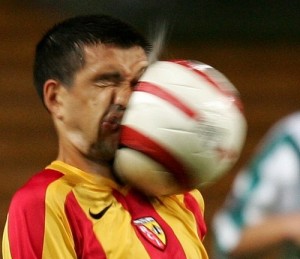 I’ve been an American soccer fan for a long-time, and I can’t stand it anymore. Words like “pace” and “result” should be barred from the game.
I’ve been an American soccer fan for a long-time, and I can’t stand it anymore. Words like “pace” and “result” should be barred from the game.
In case you’ve never seen a soccer match, many soccer fans and sports writers use the word “pace” when describing a fast player. For example, they’ll say So-And-So “has pace,” or “is pacey.”
Dumbest thing ever. Continue reading…

Bert Williams is 90. You don’t him by name, but he’s the English keeper who allowed a single goal in the team’s monumental loss to America at the 1950 World Cup.
In an interview with the Associated Press this week, he said he was “virtually one of the spectators,” since England dominated possession, but couldn’t “get the ball past” the American defense. “As soon as England played a good ball through, the whole American team retreated to the 18-yard line,” the keeper remembers. “We thought the score should have been 8-1, 10-1 even.”
But it wasn’t. The U.S. won 1-0. Contrary to what ESPN reports, Williams said it was a freak goal that never should have been. “I had the ball covered and it was a deflection off one of their players who was standing in front of me,” he said. “I was going the right way. It just happened.”
What’s more, Williams said the Americans had “no intention of winning,” and even showed up to the game smoking cigars and wearing cowboy hats.
My response: We’ll take it. And have for the last 60 years.

It may be called “the beautiful game,” but soccer is full of bad acting.
If fans want their sport to be taken seriously by fellow Americans—in other words, thrive here—they need to shun diving from the game at all levels. Otherwise, tough-loving American sports fans will never embrace the sport. And soccer fans in general will continue to get an inferior product. Continue reading…
[youtube]http://www.youtube.com/watch?v=v0xo05N89RU[/youtube]Told you so.
 In the 1920s, U.S. soccer proponents were clamoring for a rule change, according to Soccer in a Football World. Said advocates wanted to “Americanize” the game. Specifically, they thought it was ridiculous that substitutions weren’t allowed, even for injured players. So the U.S. Soccer Federation rightfully changed the rule to allow for substitutions—long before either FIFA or the English Premiership did the same.
In the 1920s, U.S. soccer proponents were clamoring for a rule change, according to Soccer in a Football World. Said advocates wanted to “Americanize” the game. Specifically, they thought it was ridiculous that substitutions weren’t allowed, even for injured players. So the U.S. Soccer Federation rightfully changed the rule to allow for substitutions—long before either FIFA or the English Premiership did the same.
“This was an innovation which had come very late in relation to other American sports,” writes author David Wangerin on page 67, “though it was not until 1965 that the [English Premiership] allowed substitutes and another five years before they were seen at the World Cup.”
Fancy that. It’s unclear what other countries (if any) were also calling for substitutions at the time. But it’s obvious “Americanization” was on the right side of the argument, despite what purists may have argued. And it’s a clear reminder that changes to the game are sometimes a good thing.
Admittedly, soccer is a wonderfully climatic sport. You wouldn’t be reading this if you didn’t agree. But you’re thick if you don’t think it can benefit from innovations like those found in other sports. You’re wrong if you think it’s a perfect game.
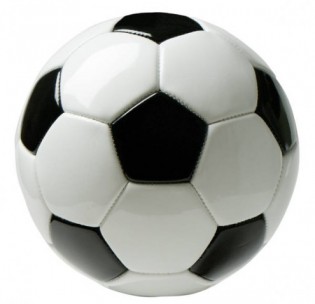 You can blame England—the inventors of the game—not America for the word.
You can blame England—the inventors of the game—not America for the word.
As the U.S. Embassy in London explains, “Soccer’s etymology is not American but British. It comes from an abbreviation for Association Football, the official name of the sport. For obvious reasons, English newspapers in the 1880s couldn’t use the first three letters of Association as an abbreviation, so they took the next syllable, S-O-C. With the British penchant for adding ‘-er’ at the end of words—punter, footballer, copper, and rugger—the word ‘soccer’ was born, over a hundred years ago, in England, the home of soccer. Americans adopted it and kept using it because we have our own indigenous sport called football.”
Still don’t like the word soccer? You can file an official complaint with South Africa, Australia, Ireland, New Zealand, and a handful of others in addition to the U.S. who all refer to the sport as “soccer.”
See also



 Soccer doesn’t make much sense to Americans. Admittedly, it defies many principles we value most in domestic sports, including conclusive endings, lots of scoring, and sportsmanship (aka
Soccer doesn’t make much sense to Americans. Admittedly, it defies many principles we value most in domestic sports, including conclusive endings, lots of scoring, and sportsmanship (aka 



 I’ve been an American soccer fan for a long-time, and I can’t stand it anymore. Words like “pace” and “result” should be barred from the game.
I’ve been an American soccer fan for a long-time, and I can’t stand it anymore. Words like “pace” and “result” should be barred from the game.

 In the 1920s, U.S. soccer proponents were clamoring for a rule change, according to
In the 1920s, U.S. soccer proponents were clamoring for a rule change, according to  You can blame England—the inventors of the game—not America for the word.
You can blame England—the inventors of the game—not America for the word.